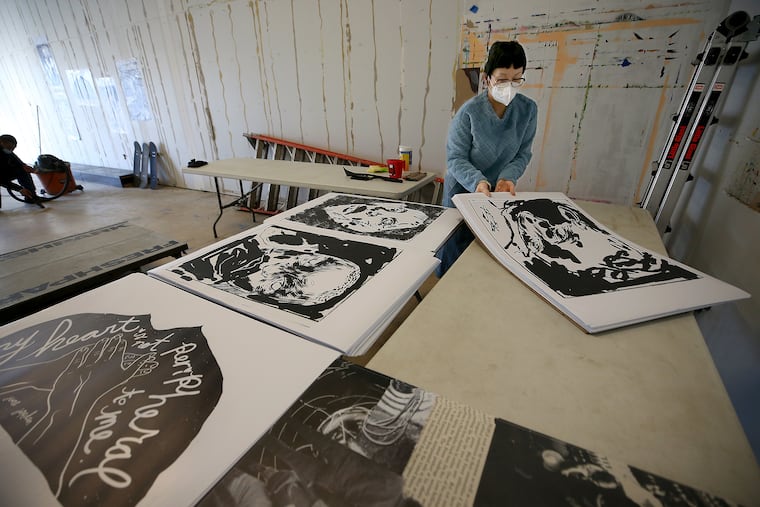Why my fight against anti-Asian discrimination had me confronting racist mac and cheese in Philly | Opinion
Historically othered populations like ours have to define microaggressions, while also navigating justice for the murders of our elders.

I was fighting racist mac and cheese in Philadelphia last week.
Vichar Ratanapakdee, an 84-year-old Thai man, was shoved to his death in Oakland, CA on Jan. 28 after recently receiving his first dose of COVID-19 vaccine. Christian Hall, a Chinese adoptee, was shot to death in December by Pennsylvania State Police in the Poconos, his hands up in supplication. These are just two examples from dozens of reports of violence and hate against Asians in America documented since last March.
Amid all this, I had to fight racist mac and cheese.
» READ MORE: I didn’t want to write about coronavirus and racism. Then I got harassed twice. | Opinion
Yes, the mac is real. A Roxborough restaurant called house-made mac topped with “Chinese chili garlic sauce” its “COVID Mac,” as CBS reported last week. Days later, the Mayor’s Commission on Asian Pacific American Affairs, of which I am the Treasurer, released a joint statement with the full suite of the Mayor’s commissions and Office of Immigrant affairs to disavow racist attacks on Asian Americans, including but not limited to the menu item. Meanwhile, its creators have since tried to delete it from memory, which is the most telling thing about it.
In the lede of a Feb. 22 Washington Post article, the attacks on Asian Americans are described as “high profile.” High profile is not the phrase we use in my family to describe being spat at, hearing slurs yelled at us. Those aren’t the words we use when a Chinese grandmother is beaten up on the street. High profile isn’t how we describe being deported because we pray to the wrong God or pay too little to be here. High profile isn’t how we describe being jailed because we don’t speak English, being evicted because we don’t have citizenship. When those things happen, we don’t call the story high profile. We use words like tragic, hate-filled, frightening. High-profile attacks is a phrase that happens when we Asian Americans are treated as data, as ingredients. It reduces us to shocking news items that prompt brief hand-wringing before most coverage moves on. We don’t begin to understand how we are victims of hate by counting how many witnesses we had.
The news this month isn’t that Americans hate Asians. That is not news to us. The news is that others need the news to remind them that Asians in America deserve to be treated as complete humans. The news is that anti-Asian prejudice runs so deep I have to spend time fighting racist—yes, racist—mac and cheese that equates an Asian condiment with COVID-19.
I see many Americans are reiterating the history of the exclusion act, internment order, the travel bans, to remind some abstract “us” that some abstract “America” criminalized participation in the human experiment for Asian immigrants and their descendants. The secret is that the “us” and the “America” are the same: a popular majority voted for the presidents who signed these orders. Yet even after so many “high profile” incidents of hate, America still hasn’t learned its lesson.
Our so-called “minority group” runs full throttle to prove our humanity today. We want everyone else to see all of us. It is a lot of ground to cover, so let me acknowledge our collective fatigue. We are fighting for our dignity with the same depletion of energy as everyone else. We, too, are inundated by crowdfunded healthcare services and funerals. We, too, are collapsing under the breathless ferocity of working around the clock. We, too, are making the best of keeping everybody fed, housed, loved, while the world falls apart.
» READ MORE: Philly TV anchor: The racism around coronavirus will leave lasting wounds on Asians and Asian Americans | Opinion
But on top of that, as an Asian-American leader in Philadelphia, last week I was fighting mac and cheese.
I take up what may sound like a “silly” fight because this is the complex reality of how we as Asians have to prove our humanity; because the only rule of engagement that matters now is to fight like hell for every single thing in communities that continue to be devalued. Historically othered populations like ours have to define microaggressions, while also navigating justice for the murders of our elders.
My hope is not to be perceived as arch or ironic in addressing a fast food item, or worse, to be perceived as apathetic because I am not demanding redress for more serious crimes. To speak humbly is dangerous for Asian Americans, because the perception of our passivity, of us as “quiet,” is the greatest lie we’ve ever belied. So let me be clear. The problem is not that we are silent. The problem is that we are not heard. And that’s why I keep fighting. Listen to us the first time we tell you we deserve to be treated as complete humans, so we do not become high profile victims when we take our last breaths.
Anne Ishii is the executive director of the Asian Arts Initiative in Philadelphia.